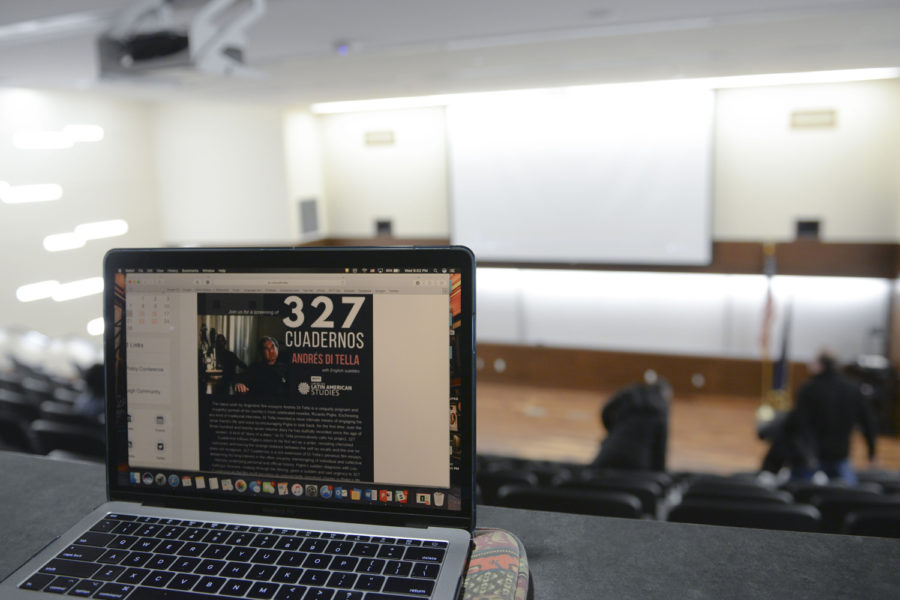Ricardo Piglia was 15 years old when his father was thrown in prison for a year for supporting Argentina’s former leader — so the young teen began keeping a diary.
It started about the same time Juan Peron, President of Argentina, was overthrown in a coup d’etat in 1955. While it began with one journal, Piglia estimates he filled 327 notebooks over the course of his life.
His story caught the attention of Andres Di Tella, a fellow Argentinian and award-winning filmmaker. Di Tella was then inspired to create “327 Cuadernos,” a documentary depicting Piglia rereading and cataloguing his diaries over the course of several years, something he had never done before.
As part of an event hosted by the Film Studies Program, 33 people gathered to watch Di Tella’s film in the Public Health building Wednesday night. Di Tella also answered audience questions after the screening of the film.
“There were some people who were not sure whether the diaries actually existed,” Di Tella said. “He had mentioned them in interviews and snippets in text, but nobody was sure they existed.”
The film, which features selected passages from Piglia’s diaries narrated by Piglia, is interspersed with old footage depicting the era in which he grew up. Some of the vintage footage comes from an archive of family films owned by a friend of Di Tella. Other portions contain news footage depicting famous events, such as the brother of famous communist revolutionary Che Guevara reacting to news of the Central Intelligence Agency-orchestrated death of his brother in Bolivia.
Di Tella said the film’s intention is “to keep a diary of the reading of a diary.” During the process of filming, Piglia becomes ill with Lou Gehrig’s disease — a disease that breaks down nerve cells and reduces the function of muscles — and slowly loses his mobility. In one scene, Piglia is reduced from flipping through his book and writing to dictating it to someone typing his words into a document.
Much of the film is Piglia ruminating on the nature of writing and events throughout his life and the lives of his friends. Piglia criticizes 20th-century novelist Franz Kafka at the beginning of the film because Kafka did not want his diaries to be published even though he did not destroy them. Piglia then entertains the idea of publishing them under the names of one of his characters, Emilio Renzi, or even burning them.
After working through the first phases of his diaries, Piglia eventually became one of the most prominent contemporary Argentine writers, publishing five novels, a number of essays and four short story collections. He taught Latin American literature at Princeton University from 2001 until 2011. In one scene from the film, Piglia considers the idea of writing about his life.
“There’s nothing more ridiculous than the aspiration of recording one’s own life,” Piglia tells the camera.
As the film ends, Piglia is shown burning one of his diaries. Di Tella said someone convinced him not to burn all of them. Piglia died in January 2017, and his diaries have been published in a set of three volumes.
After the screening, Di Tella answered questions about the film posed by the audience, which was largely composed of graduate students and faculty from the department of Hispanic languages and literature.
Daniel Balderston, a Mellon professor of modern languages, was familiar with the background of Piglia. He described how Piglia was constantly creating.
“He was also working up until the day he died,” Balderston said during the question and answer segment.
He also asked Di Tella about his choice to use what seemed like unrelated footage. Di Tella said scraps of paper from the diaries inspired the added footage in the film. He said there were pieces newspapers, tickets and other papers in the notebooks.
“When I saw these little pieces of paper, I thought that the readings of his diary would go hand in hand with just the details of [collected papers],” Di Tella said.
Pedros Salas, a recent Pitt graduate and current employee at Slippery Rock University, said he came because many of his former classmates were in attendance and he was a fan of Piglia.
“I’ve read several of his books … I like him a lot,” Salas said. “I really liked hearing Piglia talk about his own diaries, and [for it] to be surrounded by the historical fragments was also really interesting.”


